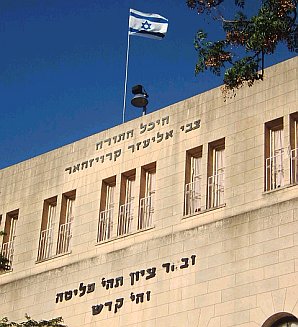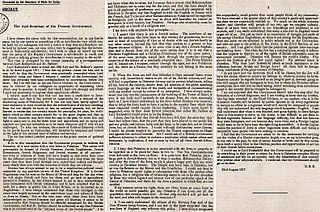Antisemitism has increased greatly in the Arab world since the beginning of the 20th century, for several reasons: the dissolution and breakdown of the Ottoman Empire and traditional Islamic society; European influence, brought about by Western imperialism and Arab Christians; Nazi propaganda and relations between Nazi Germany and the Arab world; resentment over Jewish nationalism; the rise of Arab nationalism; and the widespread proliferation of anti-Jewish and anti-Zionist conspiracy theories.
This is a partial timeline of Zionism in the modern era, since the start of the 16th century.

The Zionist occupation government, Zionist occupational government or Zionist-occupied government (ZOG), sometimes also referred to as the Jewish occupational government (JOG), is an antisemitic conspiracy theory claiming Jews secretly control the governments of Western states. It is a contemporary variation on the centuries-old belief in an international Jewish conspiracy. According to believers, a secret Zionist organization is actively controling international banks, and through them governments, in order to collude against white, Christian, or Islamic interests.

Nachman Syrkin was a political theorist, founder of Labor Zionism and a prolific writer in the Hebrew, Yiddish, Russian, German and English languages.

Bernard Lazare was a French literary critic, political journalist, polemicist, and anarchist. He is known as the first Dreyfusard.
The First Aliyah, also known as the agriculture Aliyah, was a major wave of Jewish immigration (aliyah) to Ottoman Syria between 1881 and 1903. Jews who migrated in this wave came mostly from Eastern Europe and from Yemen, stimulated by pogroms and violence against the Jews. An estimated 25,000 Jews immigrated. Many of the European Jewish immigrants during the late 19th-early 20th century period gave up after a few months and went back to their country of origin, often suffering from hunger and disease.

From the founding of political Zionism in the 1890s, Haredi Jewish leaders voiced objections to its secular orientation, and before the establishment of the State of Israel, the vast majority of Haredi Jews were opposed to Zionism, like early Reform Judaism, but with distinct reasoning. This was chiefly due to the concern that secular nationalism would redefine the Jewish nation from a religious community based in their alliance to God for whom adherence to religious laws were “the essence of the nation’s task, purpose, and right to exists,” to an ethnic group like any other as well as the view that it was forbidden for the Jews to re-constitute Jewish rule in the Land of Israel before the arrival of the Messiah. Those rabbis who did support Jewish resettlement in Palestine in the late 19th century had no intention to conquer Palestine and declare its independence from the rule of the Ottoman Turks, and some preferred that only observant Jews be allowed to settle there.

Theodor Herzl was an Austro-Hungarian Jewish journalist and political activist who was the father of modern political Zionism. Herzl formed the Zionist Organization and promoted Jewish immigration to Palestine in an effort to form a Jewish state.

The First Zionist Congress was the inaugural congress of the Zionist Organization (ZO) held in Basel on August 29–31, 1897. Two hundred and eight delegates and 26 press correspondents attended the event. It was convened and chaired by Theodor Herzl, the founder of the modern Zionism movement. The Congress formulated a Zionist platform, known as the Basel program, and founded the Zionist Organization. It also adopted the Hatikvah as its anthem.
As an organized nationalist movement, Zionism is generally considered to have been founded by Theodor Herzl in 1897. However, the history of Zionism began earlier and is intertwined with Jewish history and Judaism. The organizations of Hovevei Zion, held as the forerunners of modern Zionist ideals, were responsible for the creation of 20 Jewish towns in Palestine between 1870 and 1897.

Anti-Zionism is opposition to Zionism. Although anti-Zionism is a heterogeneous phenomenon, all its proponents agree that the creation of the modern State of Israel, and the movement to create a sovereign Jewish state in the region of Palestine—the biblical Land of Israel—was flawed or unjust in some way.
Rabbi Dr. Jacob Itzhak Niemirower was a Romanian Modern rabbi, theologist, philosopher and historian. Allied with reformist trends in Western and Eastern European Judaism, he served as the first Chief Rabbi of Romanian Jewry between 1921 and 1939, and was a member of the Romanian Senate from 1927 until his death.

Alfred Nossig was a Jewish sculptor, writer, and activist in Zionism and Polish civil society. During World War II he was held in the Warsaw Ghetto. Other Jews later accused Nossig of collaboration with the Gestapo, after which he was executed by a resistance organization.

Yossi Goldstein is an Israeli historian and biographer. Goldstein's research focuses on Modern Jewish History, the History of Zionism, and the History of the State of Israel. Goldstein is a professor at the Faculty of the Social Sciences and the Humanities at the Ariel University Center. He has published biographies of Eli Horovitz, Levi Eshkol, Yitzhak Rabin and Golda Meir.

The Jewish left consists of Jews who identify with, or support, left-wing or left-liberal causes, consciously as Jews, either as individuals or through organizations. There is no one organization or movement which constitutes the Jewish left, however. Jews have been major forces in the history of the labor movement, the settlement house movement, the women's rights movement, anti-racist and anti-colonialist work, and anti-fascist and anti-capitalist organizations of many forms in Europe, the United States, Australia, Algeria, Iraq, Ethiopia, South Africa, and modern-day Israel. Jews have a history of involvement in anarchism, socialism, Marxism, and Western liberalism. Although the expression "on the left" covers a range of politics, many well-known figures "on the left" have been of Jews who were born into Jewish families and have various degrees of connection to Jewish communities, Jewish culture, Jewish tradition, or the Jewish religion in its many variants.

Poale Zion was a movement of Marxist–Zionist Jewish workers founded in various cities of Poland, Europe and the Russian Empire at about the turn of the 20th century after the Bund rejected Zionism in 1901.
Labor Zionism or socialist Zionism refers to the left-wing, socialist variation of Zionism. For many years, it was the most significant tendency among Zionists and Zionist organizations, and was seen as the Zionist sector of the historic Jewish labour movements of Eastern Europe and Central Europe, eventually developing local units in most countries with sizable Jewish populations. Unlike the "political Zionist" tendency founded by Theodor Herzl and advocated by Chaim Weizmann, Labor Zionists did not believe that a Jewish state would be created by simply appealing to the international community or to powerful nations such as the United Kingdom, Germany, or the former Ottoman Empire. Rather, they believed that a Jewish state could only be created through the efforts of the Jewish working class making aliyah to the Land of Israel and raising a country through the creation of a Labor Jewish society with rural kibbutzim and moshavim, and an urban Jewish Proletariat.

Revolutionary Yiddishland: A History of Jewish Radicalism is a book written by Alain Brossat and Sylvie Klingberg about the history of Jews in leftist movements in the 20th century. First published in French in 1983, an English translation of the second edition was published by Verso Books in 2016.

The Second World Zionist Congress met in Basel, Switzerland on 28 August 1898. and was the second meeting of the Zionist Organisation. The World Zionist Congress brought together delegates from across the world to raise funds, lobby support and create the institutions that would one day form the modern day Jewish State known as Israel, which was established in 1948. The Congress met every year from 1897 to 1901. The main focus of the Second Congress, as set out by its chair, Theodor Herzl, was to engage with Jewish communities in the diaspora and encourage them to adopt Political Zionism.
Zionist antisemitism is the phenomenon in which individuals, groups, or governments support the Zionist movement and the State of Israel while simultaneously holding antisemitic views about Jews. In some cases, Zionism may be promoted for explicitly antisemitic reasons. The prevalence of antisemitism has been widely noted within the Christian Zionist movement, whose adherents may hold antisemitic beliefs about Jews while also supporting Zionism for eschatological reasons. Antisemitic right-wing nationalists, particularly in Europe and the United States, sometimes support the Zionist movement because they wish for Jews to be expelled, or for Jews to emigrate to Israel, or because they view Israel as a supremacist ethno-state to be admired and held up as a model for their own countries.













